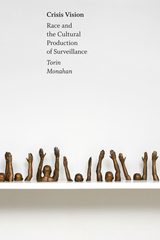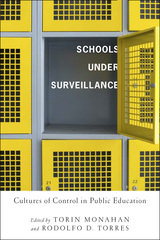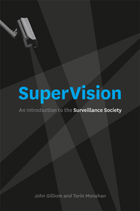4 books by Monahan, Torin

Crisis Vision
Race and the Cultural Production of Surveillance
Tom Monahan
Duke University Press, 2022
In Crisis Vision, Torin Monahan explores how artists confront the racializing dimensions of contemporary surveillance. He focuses on artists ranging from Kai Wiedenhöfer, Paolo Cirio, and Hank Willis Thomas to Claudia Rankine and Dread Scott, who engage with what he calls crisis vision—the regimes of racializing surveillance that position black and brown bodies as targets for police and state violence. Many artists, Monahan contends, remain invested in frameworks that privilege transparency, universality, and individual responsibility in ways that often occlude racial difference. Other artists, however, disrupt crisis vision by confronting white supremacy and destabilizing hierarchies through the performance of opacity. Whether fostering a recognition of a shared responsibility and complicity for the violence of crisis vision or critiquing how vulnerable groups are constructed and treated globally, these artists emphasize ethical relations between strangers and ask viewers to question their own place within unjust social orders.
[more]

Schools Under Surveillance
Cultures of Control in Public Education
Monahan, Torin
Rutgers University Press, 2009
Schools under Surveillance gathers together some of the very best researchers studying surveillance and discipline in contemporary public schools. Surveillance is not simply about monitoring or tracking individuals and their dataùit is about the structuring of power relations through human, technical, or hybrid control mechanisms. Essays cover a broad range of topics including police and military recruiters on campus, testing and accountability regimes such as No Child Left Behind, and efforts by students and teachers to circumvent the most egregious forms of surveillance in public education. Each contributor is committed to the continued critique of the disparity and inequality in the use of surveillance to target and sort students along lines of race, class, and gender.
[more]

SuperVision
An Introduction to the Surveillance Society
John Gilliom and Torin Monahan
University of Chicago Press, 2012
We live in a surveillance society. Anyone who uses a credit card, cell phone, or even search engines to navigate the Web is being monitored and assessed—and often in ways that are imperceptible to us. The first general introduction to the growing field of surveillance studies, SuperVision uses examples drawn from everyday technologies to show how surveillance is used, who is using it, and how it affects our world.
Beginning with a look at the activities and technologies that connect most people to the surveillance matrix, from identification cards to GPS devices in our cars to Facebook, John Gilliom and Torin Monahan invite readers to critically explore surveillance as it relates to issues of law, power, freedom, and inequality. Even if you avoid using credit cards and stay off Facebook, they show, going to work or school inevitably embeds you in surveillance relationships. Finally, they discuss the more obvious forms of surveillance, including the security systems used at airports and on city streets, which both epitomize contemporary surveillance and make impossibly grand promises of safety and security.
Gilliom and Monahan are among the foremost experts on surveillance and society, and, with SuperVision, they offer an immensely accessible and engaging guide, giving readers the tools to understand and to question how deeply surveillance has been woven into the fabric of our everyday lives.
[more]

Surveillance in the Time of Insecurity
Monahan, Torin
Rutgers University Press, 2010
Threats of terrorism, natural disaster, identity theft, job loss, illegal immigration, and even biblical apocalypse—all are perils that trigger alarm in people today. Although there may be a factual basis for many of these fears, they do not simply represent objective conditions. Feelings of insecurity are instilled by politicians and the media, and sustained by urban fortification, technological surveillance, and economic vulnerability.
Surveillance in the Time of Insecurity fuses advanced theoretical accounts of state power and neoliberalism with original research from the social settings in which insecurity dynamics play out in the new century. Torin Monahan explores the counterterrorism-themed show 24, Rapture fiction, traffic control centers, security conferences, public housing, and gated communities, and examines how each manifests complex relationships of inequality, insecurity, and surveillance. Alleviating insecurity requires that we confront its mythic dimensions, the politics inherent in new configurations of security provision, and the structural obstacles to achieving equality in societies.
Surveillance in the Time of Insecurity fuses advanced theoretical accounts of state power and neoliberalism with original research from the social settings in which insecurity dynamics play out in the new century. Torin Monahan explores the counterterrorism-themed show 24, Rapture fiction, traffic control centers, security conferences, public housing, and gated communities, and examines how each manifests complex relationships of inequality, insecurity, and surveillance. Alleviating insecurity requires that we confront its mythic dimensions, the politics inherent in new configurations of security provision, and the structural obstacles to achieving equality in societies.
[more]
READERS
Browse our collection.
PUBLISHERS
See BiblioVault's publisher services.
STUDENT SERVICES
Files for college accessibility offices.
UChicago Accessibility Resources
home | accessibility | search | about | contact us
BiblioVault ® 2001 - 2024
The University of Chicago Press









